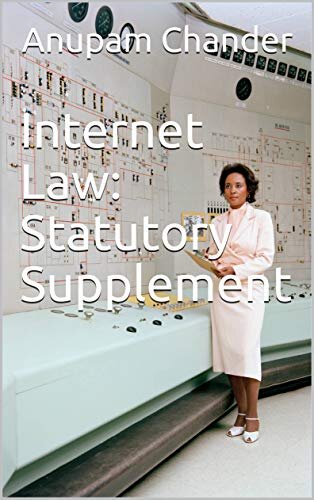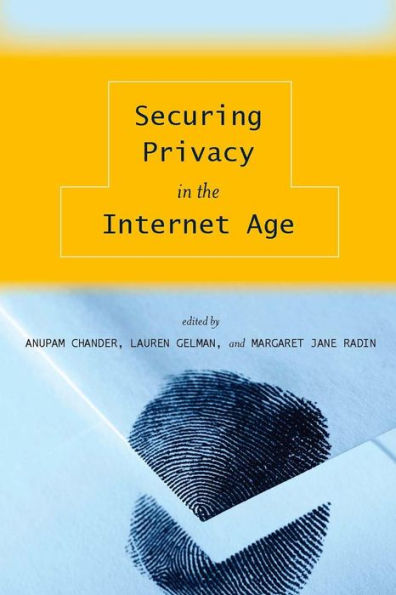Published Books
About Internet Law: Statutory Supplement
The key statutes and other regulatory codes defining internet law, from the DMCA to the Computer Fraud and Abuse Act, from the General Data Protection Regulation to the Internet Tax Freedom Act. This book is designed for students who need a handbook compiling various statutes regulating the internet. The statutes are presented in edited form to focus on their key aspects relevant to the regulation of private sector actors.
Chander, Anupam. Internet Law: Cases and Materials (2019).
About Internet Law: Statutory Supplement
The key statutes and other regulatory codes defining internet law, from the DMCA to the Computer Fraud and Abuse Act, from the General Data Protection Regulation to the Internet Tax Freedom Act. This book is designed for students who need a handbook compiling various statutes regulating the internet. The statutes are presented in edited form to focus on their key aspects relevant to the regulation of private sector actors.
Chander, Anupam. Internet Law: Statutory Supplement (2019). Creative Commons Attribution.
The Electronic Silk Road
How the Web Binds the World Together In Commerce
About The silk Road
This is a book about how law can both foster and regulate trade in services. We must protect local control of global Internet trade without jeopardizing either human rights or the worldwide nature of the web. Globalization with a human face will require us to manage cybertrade to allow us to engage with the world yet at the same time feel that we are not at the world’s mercy
Chander, Anupam, Introduction to The Electronic Silk Road (May 2, 2016). The Electronic Silk Road, Yale University Press, 2013. Available at SSRN: https://ssrn.com/abstract=2773736
• “A visionary read . . . I commend this book to all those who think about a future that is to be faced and not feared.” Mike Moore, Former Prime Minister of New Zealand, Former Director General of the World Trade Organization, New Zealand Ambassador to the United States
• “A masterly analysis,” “a tour de force” Jagdish Bhagwati, University Professor, Columbia University
• “An important guide to outdated rules governing global online trade,” Financial Times
• “An important contribution to thinking about the international legal order,” Ricardo Ramírez-Hernández, Chair of the Appellate Body, World Trade Organization
• “Extraordinarily lucid … This is an important book.” W. Michael Reisman, Myres S. McDougal Professor of International Law, Yale Law School
• “A must read for those interested in globalization,” United States Senator Chris Coons
• “A fascinating journey… Anyone interested in the digital transformation of commerce should consider carefully Chander’s insights,” Mark Wu, Harvard law professor
• “Chander beautifully weaves together theory, practice, trade, culture, and politics into a complex yet clear argument, a sophisticated yet down-to-earth analysis, and a beautifully written text,” Michael Birnhack (Tel Aviv), book review in 108 Am. J. Int'l L. 562, 568 (2014).
• “filled with insight, delightfully well written and a source for further inquiry,” Jeffery Atik (Loyola L.A.), in book review for the World Trade Review (2015)
• “A compelling case . . . fascinating.”—Glenn C. Altschuler, Huffington Post (Cornell University Vice President for University Relations, the Dean of the School of Continuing Education and Summer Sessions, Thomas and Dorothy Litwin Professor of American Studies)
• “Chander’s book is a knowledgeable and a timely intervention … recommended for those who want to peek into the nuts and bolts of the internet, understand the application of the law that guides it, and finally, follow the smell of money!” Mahima Kaul, Observer Research Foundation (New Delhi)
• “Chander’s work should be required reading on the linkage of freedom of speech, commercial data gathering, and government access, and his prose style renders seemingly mundane details as both consequential and easy to understand.”—Publishers Weekly
• “This interesting book … suggests ways that countries can benefit from the many positive aspects of an open Internet while still preserving democratically determined preferences about what content should be allowed online and what data should remain private.” Foreign Affairs (Nov./Dec. 2013)
All American Hero
About ALL american hero
Can the life of a Japanese American interned in World War II be relevant to a young girl today? This graphic novel tells the story of Fred Korematsu, a young man who was imprisoned by the United States along with a hundred and twenty thousand other Japanese Americans, young and old, in the wake of the attack on Pearl Harbor. The text of the graphic novel is drawn from the historical records and reports on the debates both in the Japanese American community and in the courts. The novel carries the story from the 1940s internment and court challenges to the 1980s, when Fred, now in his sixties, reopened his case based on evidence that the government had withheld crucial information from the courts when Fred had been convicted of violating the internment orders. The story shows a young girl struggling with her identity as an American learning a key lesson from Fred’s life: If you have the feeling that something is wrong, don’t be afraid to speak up.
Chander, Anupam and Sunder, Madhavi, Fred Korematsu: All American Hero (2011). Fred Korematsu: All American Hero, Carolina Academic Press, 2011; UC Davis Legal Studies Research Paper No. 471. Available at SSRN: https://ssrn.com/abstract=2702601
Securing Privacy in the Internet Age
About Securing Privacy
The Internet Age has created vast and ubiquitous databases of personal information in universities, corporations, government agencies, and doctors' offices. Every week, stories of databases being compromised appear in the news. Yet, despite the fact that lost laptops and insecure computer servers jeopardize our privacy, privacy and security are typically considered in isolation. Advocates of privacy have sought to protect individuals from snooping corporations, while advocates of security have sought to protect corporations from snooping individuals. Securing Privacy in the Internet Age aims to merge the discussion of these two goals. The book brings together many of the world's leading academics, litigators, and public policy advocates to work towards enhancing privacy and security. While the traditional adversary of privacy advocates has been the government, in what they see as the role of the Orwellian Big Brother, the principal focus of this book is the fraternity of Little Brothers the corporations and individuals who seek to profit from gathering personal information about others.
Chander, Anupam, Gelman, Lauren and Radin Margaret Jane, Securing Privacy in the Internet Age (2008). Securing Privacy in the Internet Age, Stanford University Press, 2008.





